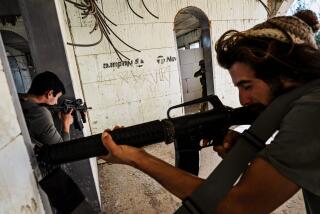Unite the Children of Abraham
- Share via
JERUSALEM — According to Jewish legend, the Cave of Machpelah, a massive stone building at the entrance to the West Bank city of Hebron and traditional burial ground of Abraham and Sarah, conceals the passageway back to the Garden of Eden. Abraham, it is said, chose the Machpelah as Sarah’s tomb after following a river of light to its source in the cave. There he met Adam, who told him his mission was to restore humanity to Eden.
Yet Hebron today symbolizes our exile from Eden. There, religion means holy war. Hebron’s Jews and Muslims see each other as intruders, usurpers of the inheritance of Abraham that both rightly claim. The completion of the long-delayed Hebron accord--stipulating Israeli withdrawal from most of the city while leaving a small Jewish enclave around the Machpelah--probably will bring more violence by creating a dangerous proximity between settlers and Palestinian police.
For both Jews and Muslims, the Machpelah, an ancient structure of vaulted ceilings and peeling walls, holds memories of mutual humiliation and massacre. For centuries, Muslims refused to allow Jews to enter, restricting them to the seventh step of an outdoor staircase. Finally, Hebron’s Jews were expelled from the city after 67 of them were massacred in a 1929 pogrom. Only when the Israeli army won Hebron in the 1967 Six-Day War could Jews again pray at their second holiest site. At the same time, successive Israeli governments have protected Arab access, even allowing Muslim officials to remain official caretakers, despite Jewish protests.
Something like coexistence evolved: Muslims and Jews would stand together before the bronze gates protecting the stone cenotaphs marking the burial spots of Abraham and Sarah below. Then, in 1994, Hebron settler Baruch Goldstein gunned down 29 Muslims at prayer inside the Machpelah. Since then, the Israeli army has enforced total separation between Muslim and Jewish worshipers, who enter the building through opposite entrances and pray in separate rooms monitored by TV cameras and divided by padlocked doors. Security remains in Israeli hands, though in the next phase of negotiations the Palestinians will demand their own military presence. Eventually, Palestinian Authority leaders say, the Machpelah will become exclusively a mosque, which Jews will be allowed to visit as tourists but not as worshipers.
For all the tension, the Machpelah remains probably the only building in the world to accommodate both an active mosque and a synagogue. Gold-lettered verses of the Koran are etched into the walls, overlooking wooden arks whose velvet curtains conceal Torah scrolls. Despite the religious exclusivists on both sides, the Machpelah clings, however tenuously, to its universalist roots. The Hebrew word “machpelah” is derived from the word for “double,” referring to the biblical couples buried there (besides Abraham and Sarah, tradition includes Isaac and Rebecca and Jacob and Leah). Yet the word hints at another doubling: the joint inheritance left by Abraham to Muslims and Jews.
Many of Abraham’s purported followers through history--Jews, Muslims and Christians--misunderstood the radical essence of his message of the oneness of creation. That misunderstanding led to holy wars. Jewish mysticism explains the expulsion from Eden as a loss of Adam’s ability to see existence as an integrated whole, resulting in idolatry. The idolatry that Abraham opposed worshiped fragments of reality--a heavenly body or a magical stone--rather than God, the whole of existence. Idolators even imagined warring gods, imposing human divisiveness onto higher realms. The task of Abraham and his descendants, then, is to restore our “spiritual sight,” our perception of oneness.
By insisting that theirs is the only truth, religious exclusivists practice a form of idolatry, worshiping a fragment of reality. The longing for God is corrupted by the idolatrous desire to possess him exclusively. By imposing their divisiveness on the Machpelah, fundamentalist Muslims and Jews obscure its essence. The challenge for the followers of Abraham is to maintain the Machpelah as a place of inclusiveness, welcoming all who would join the patriarch’s work in healing a broken world.
More to Read
Sign up for Essential California
The most important California stories and recommendations in your inbox every morning.
You may occasionally receive promotional content from the Los Angeles Times.








